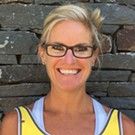Published April 28, 2004 at 1:31 p.m.
A diamond-flecked copper and green table runner adds dazzle to your dinner party. Deep blue and gold wall hangings lend the living room a regal air. Fine handmade fabrics can play a role in altering the decor inside your home. But in the case of Creative Women, what's really changing is 6000 miles away, in Addis Ababa, where the goods are produced.
Grand Isle entrepreneur Ellen Dorsch founded the textile company two years ago. "I suppose what I am is an importer," she says of her business partnership with a textile company -- Menby's Design --in Ethiopia. "But I have this goal that what we do on Earth should contribute, not take away. So I see what I'm doing as a way to create jobs in Ethiopia, and at the same time bring beautiful things to this country."
Back in the 1980s, the U.S. nightly news showed images of Ethiopia as a country literally wasting away -- the famine of 1984-1985 killed more than 1 million. But Dorsch envisioned a different land. "This sounds cosmic or something, but I had always wanted to go to Ethiopia," she says. "As I kid, I always thought Ethiopia sounded so romantic!"
Dorsch began working for the Vermont Department of Health in the 1970s, and established an international training program for Planned Parenthood before becoming a freelance health consultant. She first traveled to Africa in 1986 and saw something remarkable in the people -- particularly in the women of Uganda and Ethiopia.
"There were incredible men, too," she says. "But what struck me were the professional women who started nonprofit organizations in their countries to help other women, at the local level, deal with rights in terms of marriage and family and inheritance; they also worked on national policies." Eventually Dorsch grew frustrated with nonprofit funding issues, and in 2002 decided to pursue her relationship with the continent on different terms.
While consulting in Ethiopia -- and visiting with her daughter, whose husband was stationed there as an economist -- Dorsch noticed the intricate woven work running along the borders, or tibeb, of the women's white garments. Why not turn this edging into something Westerners would be interested in buying? "You could see some of this in tourist shops," she says. "But it wasn't being marketed in the West."
Some of the colors and patterns wouldn't fit stylistically in American homes, Dorsch realized; she hoped to translate the traditional tibeb into something slightly more contemporary yet wholly unique. She returned to Addis Ababa and shared her idea with several contacts there, eventually finding a partner in the wife of a demographer with whom Dorsch had worked --Menbere Alemayehu, a.k.a. Menby. "We decided that we would give it a try," she says. "Menby would be the production end and I would buy from her and do the marketing and the selling at this end."
Ethiopia's economy had shown signs of recovery after the hunger crisis of the mid-'80s, but by 2002 it was struggling again. A border war with Eritrea had cost billions, and the government was funding military rather than civilian projects. "It's a very fragile place," says Dorsch. "Like many parts of the world -- including our country -- the gap between the rich and the poor is just getting bigger over there. You do see conspicuous wealth in the form of beautiful cars and well-dressed people, but the poverty in Addis can be mind-boggling."
In establishing her partnership with Menby, Dorsch hoped to help families around the Ethiopian capital find long-term, sustainable solutions to financial problems. Working solely with women-owned businesses that hired mostly women seemed to be the right route. "It's not sexism," she says. "Money that gets into the hands of the women goes to the family. And -- this is not just my idea, there's a lot of research on this -- if women can be economically independent, they have a lot more control over their sexuality, their safety, their life in general. She can say to a man who's abusive or whatever, 'No, I'm not going to live in these unsafe conditions.' That has as much impact as the other work I was doing in reproductive health care. It was just another way of getting to improve women's lives."
Ironically, two men are the weavers for Creative Women; working the looms has long been an occupation for hundreds of men in Addis, while women grow and hand-spin the cotton and later do all the sewing of scarves, shawls, pillows and pocketbooks. Dorsch and Menby plan out the patterns and colors together.
"Menby and her husband had lived in the U.S.; she got a degree in design from Delaware, and her husband a Ph.D. in demography," Dorsch explains. "So she can picture a Western living room or bedroom, and has been a perfect bridge between the two cultures."
The first time Menby and Dorsch met with a weaver, he commented that the colors they had chosen were ugly. As Dorsch does not speak Amharic, Menby replied, "It really doesn't matter what you think, it matters what the people in New York think."
New York was, in fact, the site of Dorsch's first sale. Shortly after production began in fall 2002, she sold pillows and shawls to a small Brook-lyn boutique and gift store. She had been taking courses at Manhattan's Fashion Institute of Technology, where she was astonished to learn that the average high-end American bed typically supports 11 pillows.
Dorsch also joined the Museum Store Association and applied to the exclusive handmade division of the New York International Gift Fair, which is held every August in Manhattan's Javits Center and draws 45,000 buyers from hundreds of home and craft stores. Creative Women was accepted to the juried show, and Dorsch began to network extensively.
Sales were slow at first. Dorsch discovered that buyers are reluctant to place big orders with a brand-new business --even if it has a "wonderful mission of creating jobs." And when they did come through, she was confused by some of the retail jargon. "Stores would say to me, 'Can I have net 30?' and I would say, 'Sure,'" she recalls. "And then I had to phone a friend up and say, 'What did I just give them, net 30?' It means they can have 30 days to pay me, which helps their cash flow but hurts mine."
To make finances tighter, Dorsch pays Menby for everything up front -- enough to ensure a self-sustaining business with adequate working conditions for the weavers and seamstresses in Addis Ababa. "It's an ongoing learning experience," Dorsch concedes. "I used to sleep better."
After a few real-life lessons in marketing and design, Dorsch and Menby now have their products in about 35 stores nationwide, including four in Vermont. They are expanding their line to include more pocketbooks and holiday-inspired fabrics with sparkling metallic threads. Initially hesitant customers have now seen two years of steady growth for Creative Women and are placing healthy-sized orders for shawls, scarves and pillows with invisible zippers -- a recently added product. Pillow prices start at $60. Scarves sell for around $50, shawls for $70.
Dorsch now travels to Addis Ababa twice a year and is beginning to see some subtle, positive changes in the city. As she drives through the streets, she marvels at the plots of grass and flowers appearing alongside the concrete -- a result of an Ethiopian gardening project that involves kids from poor neighborhoods.
Menby, meanwhile, envisions buying some land with her husband and building a multi-story facility for the design business, as well as a health-research institute and apartments. "It's this synergy of everyone's attempt to make some difference, and hopefully the small difference we're making over there is impacting the lives of the people she can hire, and their kids," says Dorsch. She dreams of being able to give bonuses to the workers -- just as soon as she turns enough profit.
"I used to think that change had to happen fast, it had to happen big," Dorsch reflects. "And now -- I'm almost 62 -- I think if change happens at all, it matters."
More By This Author
Speaking of...
-

Six New Spots to Eat and Drink in the Champlain Islands
Jul 18, 2023 -

Colchester Causeway Bike Ferry to Reopen for Season on August 12
Jul 31, 2020 -

Kraemer & Kin Tasting Room Comes to GreenTARA Space in North Hero
Jun 29, 2020 -

Breakfast, Lunch and Dinner — and a Banana Stand — in the Champlain Islands
Jul 30, 2019 -

History Abounds in the Lake Champlain Islands
May 25, 2019 - More »
Comments
Comments are closed.
From 2014-2020, Seven Days allowed readers to comment on all stories posted on our website. While we've appreciated the suggestions and insights, right now Seven Days is prioritizing our core mission — producing high-quality, responsible local journalism — over moderating online debates between readers.
To criticize, correct or praise our reporting, please send us a letter to the editor or send us a tip. We’ll check it out and report the results.
Online comments may return when we have better tech tools for managing them. Thanks for reading.














































